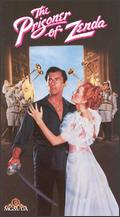The Prisoner of Zenda
Reviewed by: Brett Willis
STAFF WRITER
| Moral Rating: | Better than Average |
| Moviemaking Quality: |
|
| Primary Audience: | Teen to Adult |
| Genre: | Drama |
| Length: | 1 hr. 41 min. |
| Year of Release: | 1952 |
| USA Release: |

| Featuring |
|---|
| Stewart Granger, Deborah Kerr, James Mason, Louis Calhern, Jane Greer |
| Director |
|
Richard Thorpe |
| Producer |
| Pandro S. Berman |
| Distributor |
This is the most recent of the five film versions (not counting spoofs) of the 19th-Century novel by Anthony Hope. The screenplay is simplified and a little sanitized compared to the book (and this creates a few plot holes), but overall the film is very well done. In keeping with the romantic theme, it features two of the most sought-after British male leads of the time, Stewart Granger and James Mason.
The story is set in 1897 in the fictional kingdom of Ruritania, ruled by the House of Elphburg. Long before that time, a Ruritanian prince had an affair with an English noblewoman, the wife of Baron Rassendyl/Lord Burlesdon, and left her with child; so all later Rassendyls are really illegitimate royalty. About once in a generation, the Elphburg facial features crop out among them. The adventuresome Rudolf Rassendyl decides to journey to Ruritania for the coronation of his distant cousin, King Rudolf the Fifth. Rassendyl knows he has the Elphburg features, but doesn’t know he’s a virtual double of the new king until they meet face to face (Granger plays both roles; the dual-screen special effects are quite good).
The new king’s half-brother Black Michael (Robert Douglas), consigned to be only a duke because his mother was not of royal birth, will do anything to steal both the king’s throne and his intended bride, Princess Flavia (Deborah Kerr, “The King and I”). The night before the coronation, he drugs the king (who is known to be a hard drinker) so he’ll have to be “ill” and not show up. But the king’s aides persuade Rassendyl to impersonate the king and keep his throne warm for him until he recovers. Then Michael’s men kidnap the king, so the impersonation must go on; neither side can afford to expose the other.
There’s no profanity. There’s no nudity or direct sexual content, although the dialogue includes several roundabout references to infidelity. Madame Antoinette de Mauban (Jane Greer), a widow, lives in Michael’s castle and apparently is his mistress; she tries to thwart Michael’s schemes because if he’s successful, she’ll lose him to the princess. Michael’s chief servant, Rupert of Hentzau (Mason), is a nasty villain in his own right, ready to sell out anyone for gain. There are several on-screen deaths (not gory) and a long-drawn-out swordfight.
The enduring popularity of this story, whether in written form or on film, comes from a combination of our fascination with “doubles,” the Royal angle, and the gallant, but human heroes winning out against ruthless villains.
Although Rassendyl and the princess “fall in love” with each other while Rassendyl is playing the part of the king, both of them demonstrate an honor and dedication to duty that’s greater than their desire to run away with each other. Once the bad guys have been dealt with, Rassendyl returns to England and Flavia marries the king. (They’re choosing devotion over emotion, which is what the Biblical meaning of “love” actually is.) In the novel, Rassendyl and Flavia do keep their “forbidden love” alive by sending each other a present once a year; when this is exposed (in the novel’s sequel), it causes a great deal of hardship all around. But in this film version, they just part company cleanly, as they should.


PLEASE share your observations and insights to be posted here.